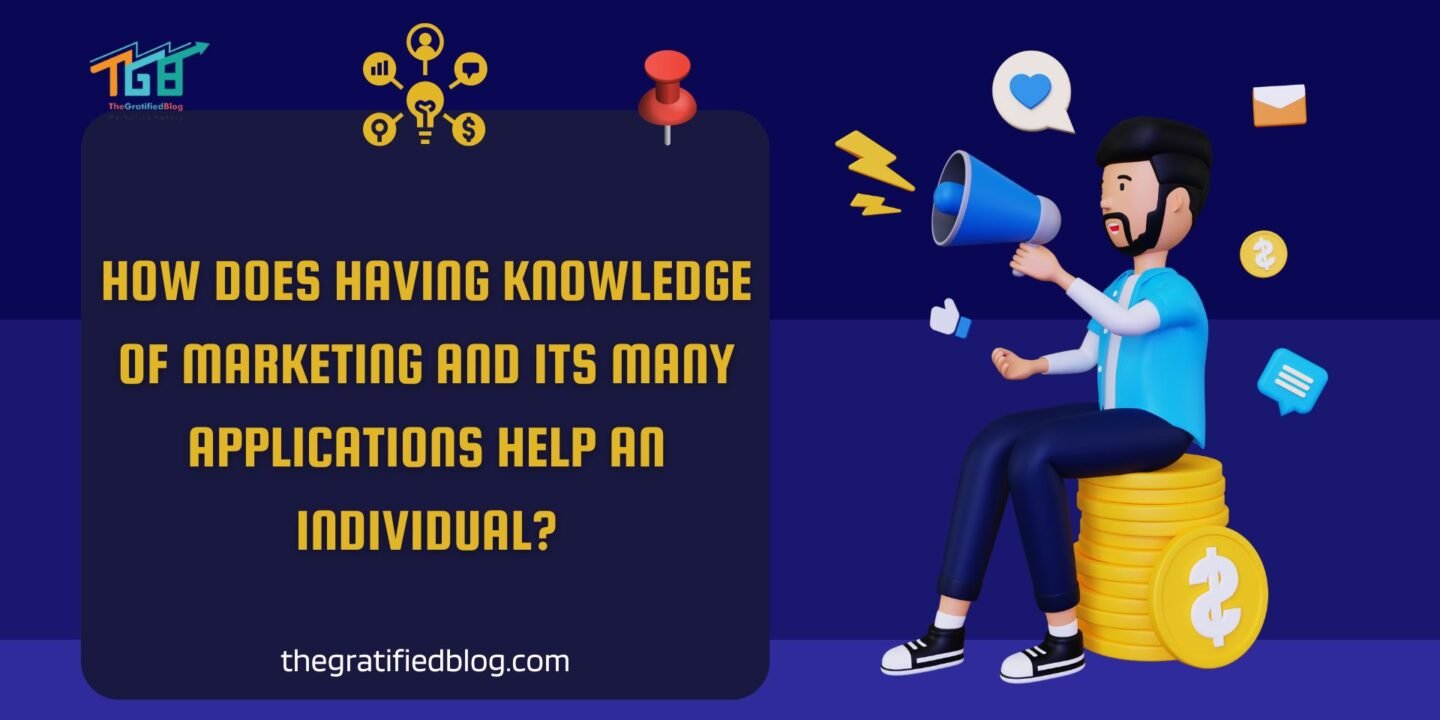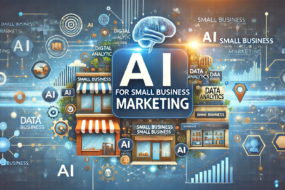
In today’s fast-paced and ever-evolving world, knowledge is power. Among the myriad of fields one can explore, marketing stands out as a beacon of opportunity and influence. Whether you’re an aspiring entrepreneur, a seasoned professional, or simply someone navigating the complexities of modern life, understanding marketing and its diverse applications can be a transformative asset. In this comprehensive exploration, “How does having knowledge of marketing and its many applications help an individual?” we delve into the multifaceted marketing realm and unravel how it empowers individuals across various domains.
Understanding The Essence Of Marketing

Marketing is more than just selling products or services; it creates value, fosters relationships, and satisfies needs and desires. With a deep understanding of consumer behavior, market trends, and communication strategies, individuals with marketing knowledge possess a unique advantage in today’s competitive landscape.
By grasping essential marketing concepts such as branding, market segmentation, and promotional tactics, individuals can proactively contribute to their organization’s success. A solid foundation in marketing enables professionals to make informed decisions, anticipate market trends, and develop innovative strategies to stay ahead of the curve.
Here are some key aspects to consider:
- Customer-Centric Approach: Marketing involves understanding your target audience’s needs, preferences, and behaviors. Businesses can tailor their offerings and messages to resonate with their audience by focusing on the customer.
- Creating Value: Effective marketing goes beyond simply promoting products or services; it creates customer value. This value can take many forms, such as solving a problem, fulfilling a desire, or enhancing the customer experience.
- Building Relationships: Building strong, lasting customer relationships is a cornerstone of successful marketing. This involves consistently engaging with customers, listening to their feedback, and establishing trust and loyalty.
- Market Research And Analysis: Marketing decisions should be based on thorough market research and analysis. Understanding market trends, competitor strategies, and consumer behavior allows businesses to make informed decisions and stay ahead of the curve.
- Effective Communication: Communication lies at the heart of marketing. Effective communication involves conveying the right message to the right audience at the right time, whether through advertising, branding, social media, or other channels.
- Adaptability And Innovation: The marketing landscape constantly evolves, driven by technological changes, consumer preferences, and market dynamics. Successful marketers must be adaptable and innovative, always seeking new ways to reach and engage their audience.
- Measuring And Evaluating Performance: Marketing efforts should be measurable, allowing businesses to track their performance and determine their marketing activities’ return on investment (ROI). This involves analyzing key metrics and adjusting strategies as needed to optimize results.
Applications Of Marketing In Various Industries
Understanding the diverse applications of marketing across industries can provide individuals with a competitive edge in today’s dynamic marketplace. From creating compelling digital campaigns in the technology sector to building strong market and customer relationships in the service industry, marketing knowledge is a valuable toolkit for professionals in any field.
Here are some examples of how marketing is applied across various industries:
- Retail Industry: Retailers heavily rely on marketing to attract customers, create compelling in-store experiences, design effective promotions, and manage their brand image. Techniques such as targeted advertising, loyalty programs, and seasonal sales are commonly used.
- Technology Industry: In the highly competitive technology sector, marketing is essential for product launches, creating buzz around new features, and building brand identity. Tech companies often use content marketing, influencer partnerships, and social media campaigns to engage with their audience.
- Healthcare Industry: Healthcare providers and pharmaceutical companies use marketing to raise awareness about health issues, promote medical services, and introduce new treatments. Marketing strategies may involve educational content, patient testimonials, and outreach programs.
- Hospitality Industry: Hotels, restaurants, and travel companies rely on marketing to attract guests, fill rooms, and increase bookings. Digital marketing, including website optimization, social media engagement, and online reviews, is particularly important in this sector.
- Automotive Industry: Car manufacturers and dealerships use marketing to showcase new models, highlight features, and drive test drives and purchases. Marketing often includes traditional advertising, experiential events, and digital campaigns targeting specific demographics.
- Financial Services Industry: Banks, insurance companies, and investment firms utilize marketing to build customer trust, promote financial products, and differentiate themselves from competitors. Content marketing, personalized messaging, and financial education programs are common strategies.
- Entertainment Industry: Film studios, music labels, and gaming companies leverage marketing to create anticipation for new releases, drive ticket or game sales, and cultivate fan communities. Marketing tactics may include teaser trailers, social media marketing and challenges, and celebrity endorsements.
- Food And Beverage Industry: Food producers, restaurants, and beverage companies use marketing to introduce new products, engage with consumers, and build brand loyalty. Influencer partnerships, experiential marketing, and packaging design are vital elements.
- Real Estate Industry: Real estate developers and agents use marketing to showcase properties, attract potential buyers or renters, and generate leads. Marketing often involves high-quality photography, virtual tours, and targeted advertising to reach prospective clients.
- Education Industry: Schools, colleges, and online learning platforms employ marketing to attract students, showcase academic programs, and communicate their unique value propositions. Content marketing, campus tours, and alumni success stories are common tactics.
How Does Having Knowledge Of Marketing And Its Many Applications Help An Individual?
Marketing is a crucial aspect of any business, and having a solid knowledge of its principles and applications can significantly benefit an individual in their professional endeavors. From understanding consumer behavior to creating effective communication strategies, a deep understanding of marketing can open up opportunities in various industries. Let us explore how having marketing knowledge can help an individual excel in their career and achieve their professional goals.
Empowering Entrepreneurs And Business Owners
Marketing knowledge is indispensable for entrepreneurs and business owners. From crafting compelling brand narratives to devising effective promotional campaigns, marketing expertise lays the groundwork for success. Entrepreneurs can refine their offerings and amplify their impact by identifying target markets, analyzing competitors, and leveraging consumer insights.
Moreover, in an era dominated by digital platforms and social media, a nuanced understanding of digital marketing techniques is essential for reaching and engaging audiences effectively. With the right strategies, entrepreneurs can expand their reach, cultivate brand loyalty, and drive sustainable growth.
Navigating Career Advancement
Marketing skills are highly sought after across industries in terms of career advancement. Whether pursuing a career in sales, public relations, market research, or product management, a solid foundation in marketing principles can open doors to diverse opportunities.
Professionals with marketing knowledge can develop comprehensive marketing strategies, analyze market data, and adapt to changing consumer preferences. By staying abreast of industry trends and mastering emerging technologies, individuals can position themselves as invaluable assets within their organizations.
Fostering Social Change And Impact
Beyond commercial pursuits, marketing is also pivotal in driving social change and fostering meaningful impact. Nonprofit organizations, advocacy groups, and social enterprises use marketing strategies to raise awareness, mobilize support, and enact positive societal change.
From creating compelling awareness campaigns to galvanizing community engagement, marketing expertise enables individuals to champion causes they’re passionate about and effectuate tangible change. By harnessing the power of storytelling, empathy, and strategic communication, individuals can become catalysts for social progress and leave a lasting legacy.
Building A Personal Brand With Marketing Skills
Building a personal brand with marketing skills is a powerful tool for individuals looking to establish themselves as industry thought leaders and stand out in a crowded job market. By applying branding principles to their professional image, individuals can effectively showcase their unique strengths and expertise to potential employers or clients.
Crafting a solid personal brand through strategic marketing techniques such as content creation, social media engagement, and networking can help individuals differentiate themselves and create lasting impressions in the minds of their target audience. Whether you’re a freelance artist, a fitness enthusiast, or a passionate advocate, understanding marketing principles can help you amplify your voice and leave a lasting impact.
Networking Opportunities Through Marketing Knowledge
Networking opportunities through marketing knowledge can significantly benefit individuals in their career paths. Understanding marketing opens doors to connecting with industry professionals, potential clients, and collaborators. By showcasing your marketing strategies and trends expertise, you can establish credibility and build relationships that can lead to new opportunities.
Attending marketing events, workshops, and conferences can further expand your network and provide valuable insights from experts in the field. Stay proactive in building your network and leveraging your marketing knowledge to create meaningful connections that can propel your career forward. Strengthening your network through marketing can be a powerful asset in today’s competitive landscape.
Data Analysis And Interpretation
In today’s data-driven world, marketing professionals often rely on data analysis to make informed decisions. Marketing knowledge includes understanding how to collect, analyze, and interpret data to optimize marketing campaigns and strategies. It involves gathering, cleaning, and analyzing data from various sources, such as sales figures, customer demographics, website traffic, and social media engagement.
Interpreting the findings is crucial for extracting meaningful insights and understanding their implications for marketing strategies. This involves translating data into actionable recommendations and predictions to optimize marketing campaigns, target specific customer segments, and allocate resources effectively.
Additionally, data interpretation helps marketers evaluate the performance of past initiatives and adjust future strategies accordingly. Proficient data analysis and interpretation empower marketers to make informed decisions, enhance customer experiences, and drive business growth in today’s data-driven marketing landscape.
Creativity And Innovation
Marketing encourages creativity and innovation in developing marketing campaigns, advertising strategies, and promotional activities. It fosters out of the box ideas for marketing and encourages individuals to find unique ways to attract and engage customers.
Creativity involves generating unique ideas, while innovation focuses on implementing those ideas effectively. In marketing, creativity manifests through compelling storytelling, visually appealing campaigns, and unconventional strategies that capture attention. Innovation is about pushing boundaries, embracing new technologies, and adapting to changing consumer behaviors.
Successful marketers combine creativity with innovation to develop disruptive campaigns, foster brand loyalty, and stay ahead in competitive markets. By leveraging creativity and innovation, businesses can create memorable experiences, build stronger consumer relationships, and achieve sustainable growth in dynamic marketing landscapes.
Frequently Asked Questions
Q1. What is marketing knowledge?
Ans. Marketing knowledge encompasses understanding consumer behavior, market trends, branding strategies, advertising techniques, and method to promote product or services effectively.
Q2. How does marketing knowledge benefit an individual?
Ans. Marketing knowledge empowers individuals to comprehend consumers’ needs and preferences, devise effective strategies to reach target audiences, build strong brand identities, and drive sales and revenue growth.
Q3. Does marketing knowledge enhance personal skills?
Ans. Yes, marketing knowledge enhances personal skills such as communication, creativity, problem-solving, and strategic thinking. These skills are valuable in both personal and professional contexts.
Q4. Can marketing knowledge be applied in non-business settings?
Ans. Absolutely. Marketing principles can be applied in various non-business settings, such as personal branding, fundraising for charities, political campaigning, and promoting social causes.
Q5. How does marketing knowledge contribute to career development?
Ans. Marketing knowledge opens up diverse career opportunities in advertising, public relations, market research, sales, digital marketing, and brand management. It equips individuals with highly sought-after versatile skills in today’s job market.
Q6. Can marketing knowledge help in entrepreneurship?
Ans. Absolutely. Marketing knowledge is essential for entrepreneurs to identify market opportunities, develop compelling value propositions, differentiate their offerings, and effectively promote their businesses to potential customers.
Conclusion
In conclusion, knowledge of marketing and its various applications is valuable in navigating the competitive market landscape. By leveraging marketing expertise, individuals can enhance networking opportunities, establish credibility, and cultivate meaningful relationships with industry professionals. Through active participation in marketing events and continuous learning, individuals can stay abreast of the latest trends and strategies, positioning themselves for success. Mastering marketing knowledge in today’s fast-paced environment can open doors to new opportunities and propel career growth. Stay committed to honing your marketing skills and utilizing them effectively to stand out in the competitive market.








No Comments